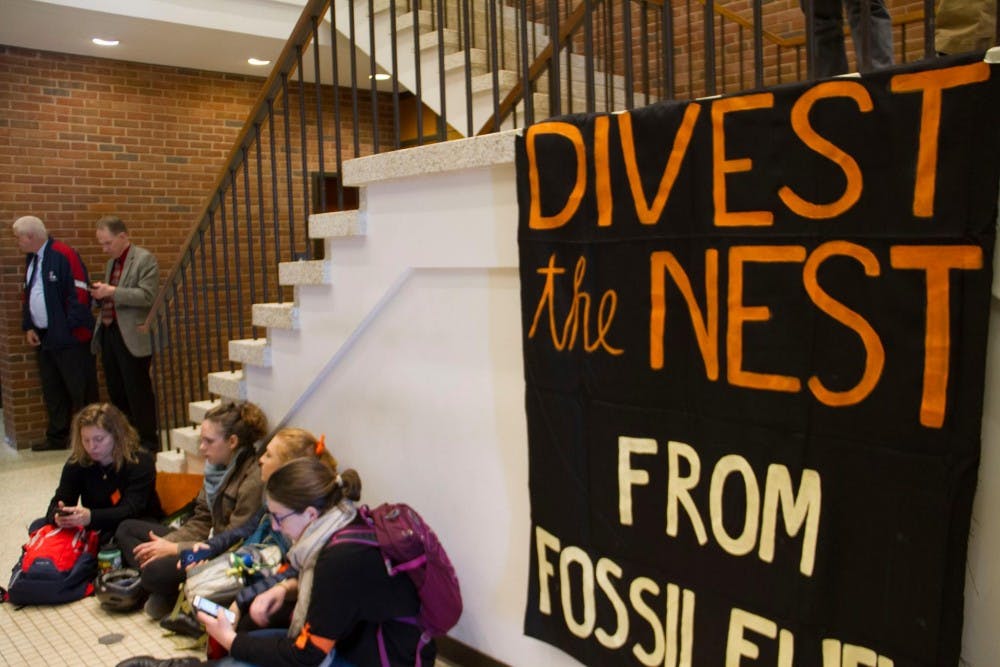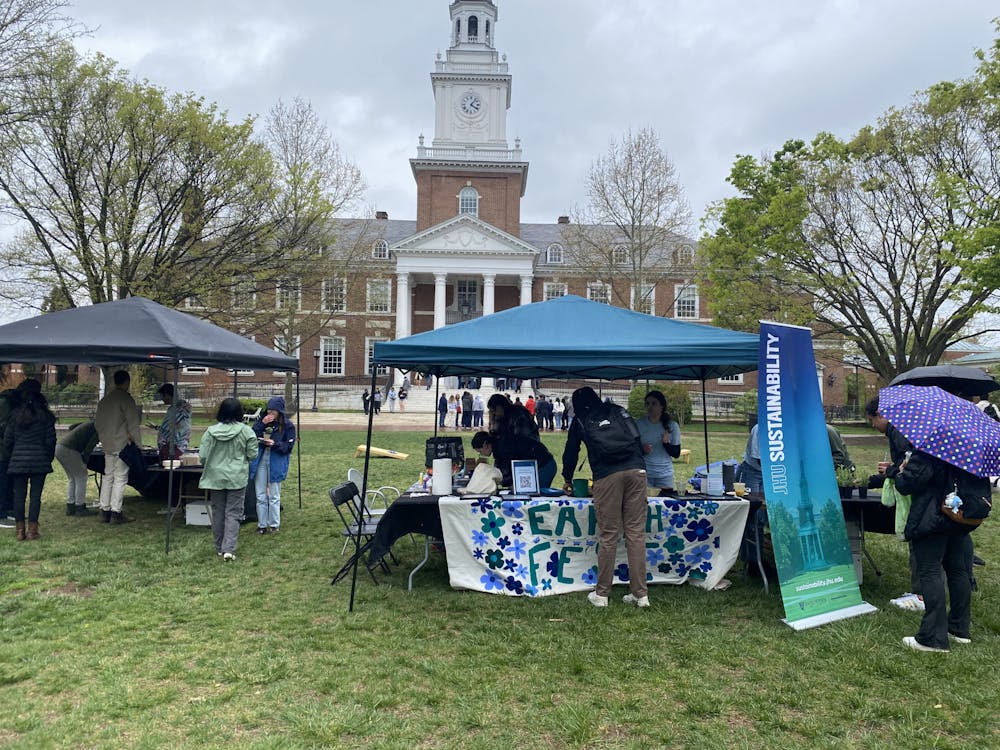The Public Interest Investment Advisory Committee (PIIAC) recommended that the University divest from fossil fuels in a report released on Friday. Following PIIAC’s recommendation, the Office of the Provost established a 30-day period for the Hopkins community to submit feedback online.
Comprised of undergraduates, graduate students, faculty and staff,
PIIAC is commissioned by the Board of Trustees to make recommendations on the University’s investments.
The Board of Trustees’ Committee on Investments will collect feedback on PIIAC’s report until Oct. 15. The Board has not yet announced a date for when it will be voting on the recommendations.
Refuel Our Future (Refuel), a student organization that has spent six years campaigning for the University to divest from fossil fuels, submitted a proposal to PIIAC in 2015. On Friday, Refuel issued a public statement on Facebook in support of the report.
Former Refuel President Maggie Weese, who graduated in 2017, said she was happily surprised. She reflected on Refuel’s growth over the years and past pushback from the administration.
“When I first joined the campaign in 2013, we were really small,” Weese said. “The University didn’t really take us seriously as an organization. We had gotten over 5000 petition signatures signed. We delivered them to the President, but he didn’t even acknowledge them.”
She criticized PIIAC for its inefficiency in recent years and for delaying its recommendations, which were originally scheduled to be released on Sept. 5.
However, she praised PIIAC’s recommendation, saying it was comprehensive and met all of the expectations laid out in Refuel’s 2015 proposal.
Weese also emphasized that PIIAC’s recommendations should not mark the end of student activism around divestment and that Refuel must hold the University accountable if the Board of Trustees votes in support of the recommendations.
“Now is a great time for organizing and pulling together all our partners,” Weese said. “The 30-day period is a key time to show how much student support there is and to make sure that students and faculty and student organizations don’t accept PIIAC’s decision as a finish line.”
Current Refuel President Atlas Elawad said that Refuel is not yet done with its mission and urged students to stay engaged with the Board of Trustees.
“We can’t take this victory and sit out on the sidelines,” Elawad said. “All of us need to stay on top of this and push the Board of Trustees to make the right vote.”
Elawad commended the report for holding the University responsible as a moral leader and said he was surprised by the extent of the recommendations.
In the report, PIIAC urges the University to divest from Carbon Underground 200 (CU 200) companies, which lead in fossil fuel consumption. However, Elawad noted that the recommendations targeted companies that were not part of the CU 200 and looked beyond withdrawing direct investments.
“What we were initially asking for was a relatively more reserved divestment strategy,” Elawad said. “Our proposal called for them to remove their direct investments in Carbon Underground 200 companies... it was a really robust divestment strategy that we hadn’t considered mostly because we didn’t have a firm understanding of the University’s finances and their investment portfolio.”
Kyra Meko, president of environmental advocacy group Students for Environmental Action (SEA), believes that the Board of Trustees has no valid reasons to vote against PIIAC’s recommendations.
“It’s consistent with [the University’s] sustainability goals and the mission of Hopkins as a public health university,” Meko said.
The report outlines some arguments both for and against divestment. Some say that divestment is unnecessary because it will have little to no direct financial impact on fossil fuel companies, though others argue that it is more important for the University to set a moral example.
Some have criticized PIIAC’s decision, like Bruce Hamilton, a professor emeritus in the economics department who is opposed to fossil fuel divestment. He believes that people still rely heavily on fossil fuels in their daily lives, and divestment fails to appropriately address climate change.
“To me, the approach to that as an economist is a carbon tax,” Hamilton said. “As a concerned citizen, I think the approach is to individually reduce our carbon footprints. That’s why I drive an electric car, that’s why I don’t turn more lights on than I need.”
Hamilton said that he supported the University’s divestment from tobacco companies and South African companies during apartheid in the late ‘80s and ‘90s. However, he feels that fossil fuel divestment is not a sensible political statement because it targets the CU 200.
“The villains are the customers rather than the providers,” Hamilton said. “As long as there are customers out there trying to buy fossil fuels, irrespective of what Hopkins does, people will provide it. The way to attack the problem is to make it less economically viable for customers to say yes, I want fossil fuels. As soon as we do that, the energy companies will stop using fossil fuels.”
He commended the University for past sustainability efforts and suggested it take alternative approaches to combating climate change.
“I could imagine the University offering grants to students to come up with steps that the University could take to reduce its own carbon footprint,” Hamilton said.
Weese believes that individuals are not the primary contributors to carbon emissions.
“Until we make changes to encourage that system to switch to more renewable and sustainable forms of energy, it doesn’t matter how much we reduce our footprint, because we’re still going to be depending on our fossil fuel divestment system,” she said.
Meko said that while individual action is also important, divesting from companies is an appropriate starting point.
“We have a responsibility to use [our] endowment in a socially responsible way,” she said.
Weese agreed that the University should set an example for others.
“Hopkins knows the power and stake that they have in Baltimore and Maryland and just in general,” she said. “[Divestment is] a statement bigger than just our usage as an individual university, and it’s more on a national and even global level.”
While Meko expects that the Board of Trustees will follow through with PIIAC’s recommendations, Weese is more uncertain, pointing out that several members of the Board of Trustees have ties to the fossil fuel industry.
“If there is a conflict of interest, they are not allowed to vote,” she said. “That will be something that Refuel Our Future will have to hold the Board members accountable for.”
Elawad is also unsure of whether the Board will vote for the recommendations but points to the University’s divestment in past decades as a sign in Refuel’s favor.
“If history is any example, with previous recommendations from PIIAC regarding socially responsible investing, they will follow through,” he said. “We will certainly do everything in our power as Refuel our Future and as the student body to make sure they follow through with this recommendation.”
















Please note All comments are eligible for publication in The News-Letter.